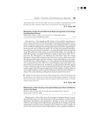 2 citations,
May 2020 in “Journal of visualized experiments”
2 citations,
May 2020 in “Journal of visualized experiments” Controlled light treatment in mouse skin speeds up healing and hair growth.
 1 citations,
May 2004 in “Journal der Deutschen Dermatologischen Gesellschaft”
1 citations,
May 2004 in “Journal der Deutschen Dermatologischen Gesellschaft” The meeting presented new findings on hair stem cells, pigmentation, genetics, and modern hair treatment techniques.
 1 citations,
January 2022 in “Stem cell biology and regenerative medicine”
1 citations,
January 2022 in “Stem cell biology and regenerative medicine” New treatments are needed for hair loss, and cell therapies might reverse hair thinning.
13 citations,
June 2014 in “Molecular therapy” The lentiviral array can monitor and predict gene activity during stem cell differentiation.
12 citations,
October 1996 in “Dermatologic clinics” Advances in genetics may lead to targeted treatments for hair disorders.
 1 citations,
April 2022 in “Regenerative Therapy”
1 citations,
April 2022 in “Regenerative Therapy” Activating the GDNF-GFRα1-RET signaling pathway could potentially promote skin and limb regeneration in humans and could be used to treat hair loss and promote wound healing.
 December 2022 in “Scientific Reports”
December 2022 in “Scientific Reports” Stem cells from whiskers can be transplanted to stimulate hair growth.
 4 citations,
June 2002 in “Clinical and experimental dermatology”
4 citations,
June 2002 in “Clinical and experimental dermatology” Effective treatment for hidradenitis suppurativa varies, with antibiotics commonly used and surgery as an option, but no single method is universally successful.
 October 2013 in “Faculty Opinions – Post-Publication Peer Review of the Biomedical Literature”
October 2013 in “Faculty Opinions – Post-Publication Peer Review of the Biomedical Literature” Three-dimensional culture helps dermal papilla cells grow new human hair follicles.
 June 2017 in “Reactions Weekly”
June 2017 in “Reactions Weekly” Some breast cancer treatments caused long-term hair loss in women, similar to a condition called alopecia areata.
 76 citations,
February 2021 in “International Journal of Molecular Sciences”
76 citations,
February 2021 in “International Journal of Molecular Sciences” Mesenchymal stem cells show potential for skin healing and anti-aging, but more research is needed for safe use, especially regarding stem cells from induced pluripotent sources.
November 2022 in “Regenerative Therapy” Advancements in tissue engineering show promise for hair follicle regeneration to treat hair loss.
January 2021 in “Elsevier eBooks” hiPSCs can help regenerate hair follicles and treat hair loss.
 January 1987 in “Journal of steroid biochemistry/Journal of Steroid Biochemistry”
January 1987 in “Journal of steroid biochemistry/Journal of Steroid Biochemistry” Norethisterone (jenapharm) therapy is effective for endometrial cancer.
 2 citations,
January 1986 in “Dermatology”
2 citations,
January 1986 in “Dermatology” A woman with Kallman's syndrome also developed alopecia universalis, a condition not previously linked to Kallman's.
4 citations,
February 2023 in “Frontiers in Oncology” Nano-Pulse Stimulation™ Therapy is more effective and less damaging than cryoablation for treating melanoma tumors in mice.
 October 2024 in “Biology”
October 2024 in “Biology” Dermal papilla cells can help regrow hair and are promising for hair loss treatments.
 5 citations,
November 2020 in “EBioMedicine”
5 citations,
November 2020 in “EBioMedicine” Disruptions in sleep-wake cycles can cause health problems like mental, metabolic, and heart diseases, and cancer.
 2 citations,
January 2014 in “Hair therapy & transplantation”
2 citations,
January 2014 in “Hair therapy & transplantation” New treatments for hair growth disorders are needed due to limited current options and complex hair follicle biology.
35 citations,
July 2008 in “Dermatologic therapy” Cicatricial alopecia may be caused by immune attacks on hair follicles, gland issues, or stem cell damage.
18 citations,
August 2019 in “Clinical breast cancer” Local hormonal treatment for vulvovaginal atrophy is likely safe for women with estrogen receptor-positive breast cancer on aromatase inhibitors.
 16 citations,
January 2007 in “Dermatology”
16 citations,
January 2007 in “Dermatology” Scientists have made progress in understanding hair follicle stem cells, identifying specific genes and markers, and suggesting their use in treating hair and skin conditions.
 43 citations,
March 2009 in “Journal of Cellular and Molecular Medicine”
43 citations,
March 2009 in “Journal of Cellular and Molecular Medicine” TGF-β2 plays a key role in human hair growth and development.
 January 2012 in “Human health handbooks”
January 2012 in “Human health handbooks” Low-level light therapy is FDA-approved for male pattern hair loss, increases hair count and strength, and is considered safe for use.
 November 2023 in “Materials Today Bio”
November 2023 in “Materials Today Bio” Light therapy might help treat hereditary hair loss by improving hair follicle growth in lab cultures.
 13 citations,
September 2020 in “International Journal of Molecular Sciences”
13 citations,
September 2020 in “International Journal of Molecular Sciences” PRP therapy and minoxidil combo works best for male hair loss.
 5 citations,
March 2015 in “Clinical and Experimental Dermatology”
5 citations,
March 2015 in “Clinical and Experimental Dermatology” Chemotherapy caused a woman's permanent hair loss and early menopause.
 January 2025 in “Frontiers in Medicine”
January 2025 in “Frontiers in Medicine” Hair follicles are key to treating vitiligo and alopecia areata, but challenges exist.
 January 2006 in “Yearbook of Dermatology and Dermatologic Surgery”
January 2006 in “Yearbook of Dermatology and Dermatologic Surgery” Hair graying is caused by the loss of pigment cells due to poor maintenance of stem cells in the hair follicle.
 17 citations,
December 2019 in “Stem Cells International”
17 citations,
December 2019 in “Stem Cells International” Bioactive molecules show promise for improving skin repair and regeneration by overcoming current challenges with further research.























